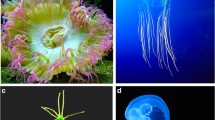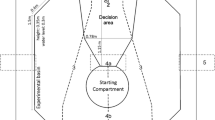Abstract.
An adult California sea lion (Zalophus californianus) with extensive experience in performing discrimination learning tasks was tested to evaluate her long-term memory for two previously learned concepts. An associative concept, that of equivalence classification, was retested after a retention interval of approximately 1 year. The sea lion had originally shown emergent equivalence classification with nonsimilarity-based classes of stimuli in a simple discrimination repeated-reversal procedure as well as in a matching-to-sample procedure. The 1-year memory test revealed no decrement in classification performance in either procedure. A relational concept, that of generalized identity matching, was retested after approximately 10 years. The sea lion had originally received trial-and-error exemplar training with identity matching-to-sample problems prior to transferring the concept to novel stimulus configurations. In the 10-year memory test, the sea lion immediately and reliably applied the previously established identity concept to familiar and novel sets of matching problems. These are the first reports of long-term conceptual memory in a nonprimate species. The experimental findings are consistent with a variety of observations of sea lions in natural settings, which indicate that natal sites, feeding areas, and individuals may be remembered over long periods of time. Electronic Supplementary Material is available if you access this article at http://dx.doi.org/10.1007/s10071-002-0153-8. On that page (frame on the left side), a link takes you directly to the supplementary material.
Similar content being viewed by others
Author information
Authors and Affiliations
Corresponding author
Electronic Supplementary Material
Video S1 (MPEG in zip, 10.5 MB)
Sea lion Rio demonstrates the associative concept of equivalence classification in the matching-to-sample procedure. On the first trial shown, Rio (1) stations in front of the apparatus while the sample stimulus “J” is displayed, (2) remains at the station while the comparison stimuli “10” and “H” are displayed, (3) moves from the station to touch the stimulus “H“ when the release cue is given, and (4) receives a class-specific conditioned reinforcer (the high pitched tone) followed by a biological reinforcer (a capelin fish) for correctly relating the two stimuli belonging to the “letter” class. On the second trial shown, Rio performs the same sequence of behaviors to correctly relate two stimuli belonging to the “number” class, and she earns the reinforcer assigned to that class (a low pitched tone followed by a herring fish)
Electronic Supplementary Material
Video S2 (MPEG in zip, 11.2 MB)
Rio demonstrates the associative concept of equivalence classification in the simple discrimination repeated-reversal procedure. Following a long sequence of correct responses to stimuli belonging to the “letter” class, Rio correctly selects letter “I” on the first trial shown, and her choice is rewarded with a class-specific reinforcer. On the following trial, the reinforcement contingencies are unexpectedly reversed, and Rio is told “no” when she selects letter “B”. Immediately following the feedback that the contingencies have changed for stimulus “B”, Rio avoids letter “F” and instead selects number “8”. Her correct response is rewarded with the reinforcer assigned to the number class
Electronic Supplementary Material
Video S3 (MPEG in zip, 10.0 MB)
Rio demonstrates the relational concept of generalized identity matching in the matching-to-sample procedure. On the first trial, “snake” appears as the sample and Rio correctly selects “snake” while avoiding “pelican”. On the following trial, “pelican” appears as the sample and Rio correctly selects “pelican” while avoiding “snake”. All of Rio’s matches of perceptually identical sample and comparison stimuli are marked by a conditioned reinforcer (a tone) followed by a fish reward (a capelin fish)
Rights and permissions
About this article
Cite this article
Reichmuth Kastak, C., Schusterman, R.J. Long-term memory for concepts in a California sea lion (Zalophus californianus). Anim Cogn 5, 225–232 (2002). https://doi.org/10.1007/s10071-002-0153-8
Received:
Revised:
Accepted:
Issue Date:
DOI: https://doi.org/10.1007/s10071-002-0153-8




